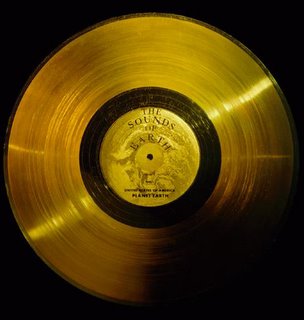
I'm not sure why, but lately I've been experiencing some circular thinking regarding the communicative powers of music. When I expose a friend to Messiaen or Bach for the first time, my hands burst into the air and I say, "he was trying to communicate his thoughts on God-- his deepest spiritual philosophies... isn't it interesting that a man so religious... who could have chosen to preach or write essays... chose music as the method?"
I've also stopped composing for the most part. Or... well, I'm composing, but lets not get into that project. Instead, I'm playing free-improvised music as a way to explore and connect. And I've been completely amazed and grateful to have found a connection to some kind of earthly root, where my reptile brain is given opportunity to say something, and holy shit! It's beautiful!
These experiences have motivated me to explore my "world music" collection which includes mostly gamelan, east and west african music, and some indian ragas. In tribal conditions, music served a very spiritual purpose. And as I explore my own improvising inclinations more and more, and I am noticing similarities to tribal music. How interesting. And now, although I'm certainly guilty of imposing my will to some extent, even Bach, Messiaen, Scriabin, and Alkan are relating to this tribal music. There is a sense of obsession to texture, timbre, and repetition. There is a sense of surrendering.
THEN... I somehow had the urge to look up the Voyager golden record. You remember, the one that was shot off to space so that aliens light years away can learn about our beautiful planet and diversity of life, behavior, and ultimately culture and art. The record included audio excerpts of animal sounds as well as sound of the earth like rain and wind. Also included were examples of music from cultures around the world. Bach prelude in C major was the only piece I knew for sure was included since I remember it being referenced in Thirty-Two Short Films about Glenn Gould. But what else was included? What did the panel decide? What mix-tape was fit for intergalactic travel?
* Bach, Brandenburg Concerto No. 2 in F. First Movement, Munich Bach Orchestra, Karl Richter, conductor. 4:40
* Java, court gamelan, "Kinds of Flowers", recorded by Robert E. Brown. 4:43
* Senegal, percussion, recorded by Charles Duvelle. 2:08
* Zaire, Pygmy girls' initiation song, recorded by Colin Turnbull. 0:56
* Australia, Aborigine songs, "Morning Star" and "Devil Bird", recorded by Sandra LeBrun Holmes. 1:26
* Mexico, "El Cascabel", performed by Lorenzo Barcelata and the Mariachi México. 3:14
* "Johnny B. Goode", written and performed by Chuck Berry. 2:38
* New Guinea, men's house song, recorded by Robert MacLennan. 1:20
* Japan, shakuhachi, "Tsuru No Sugomori" ("Crane's Nest") performed by Goro Yamaguchi. 4:51
* Bach, "Gavotte en rondeaux" from the Partita No. 3 in E major for Violin, performed by Arthur Grumiaux. 2:55
* Mozart, Die Zauberflöte, Queen of the Night aria, no. 14. Edda Moser, soprano. Bavarian State Opera, Munich, Wolfgang Sawallisch, conductor. 2:55
* Georgian S.S.R., chorus, "Tchakrulo", collected by Radio Moscow. 2:18
* Peru, panpipes and drum, collected by Casa de la Cultura, Lima. 0:52
* "Melancholy Blues", performed by Louis Armstrong and his Hot Seven. 3:05
* Azerbaijan S.S.R., bagpipes, recorded by Radio Moscow. 2:30
* Stravinsky, Rite of Spring, Sacrificial Dance, Columbia Symphony Orchestra, Igor Stravinsky, conductor. 4:35
* Bach, The Well-Tempered Clavier, Book 1, Prelude and Fugue in C, No.1. Glenn Gould, piano. 4:48
* Beethoven, Fifth Symphony, First Movement, the Philharmonia Orchestra, Otto Klemperer, conductor. 7:20
* Bulgaria, "Izlel je Delyo Hagdutin", sung by Valya Balkanska. 4:59
* Navajo Indians, Night Chant, recorded by Willard Rhodes. 0:57
* Holborne, Paueans, Galliards, Almains and Other Short Aeirs, "The Fairie Round", performed by David Munrow and the Early Music Consort of London. 1:17
* Solomon Islands, panpipes, collected by the Solomon Islands Broadcasting Service. 1:12
* Peru, wedding song, recorded by John Cohen. 0:38
* China, ch'in, "Flowing Streams", performed by Kuan P'ing-hu. 7:37
* India, raga Bhairavi, "Jaat Kahan Ho", sung by Surshri Kesar Bai Kerkar. 3:30
* "Dark Was the Night", written and performed by Blind Willie Johnson. 3:15
* Beethoven, String Quartet No. 13 in B flat, Opus 130, Cavatina, performed by Budapest String Quartet. 6:37
Phew. Boy is that controversial. Was there really room for multiple examples from a single mind? Beethoven shows up twice, Bach thrice!
This begs the obvious, glorious question. What music would you send to space? Personally, I am one to first consider the purpose. This aspect of the record was created to inform alien intelligent life of our humanity through music. Surely Beethoven and Bach deserve a spot, but I hardly find it reasonable to give them more than a track. If Western European music deserves more time, what about the great melodies? Certainly melody was under-represented. Hmmm... and which melodies are worthy of intergalactic travel? Puccini? Gershwin? Tchaikovsky?

No comments:
Post a Comment